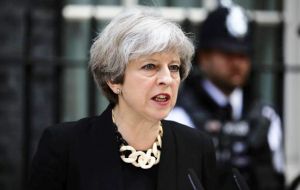MercoPress. South Atlantic News Agency
PM May preparing her “Road to Brexit” following a meeting of “war committee”
 May’s meeting with her so-called Brexit war committee at Chequers was called to try to reach agreement on a preferred vision for Britain outside the EU (Pic Reuters)
May’s meeting with her so-called Brexit war committee at Chequers was called to try to reach agreement on a preferred vision for Britain outside the EU (Pic Reuters)  PM May is also feeling the heat from Brexit Tory hardliners who have called her acceptance of a status-quo transition in March 2019, “a perversion of democracy”
PM May is also feeling the heat from Brexit Tory hardliners who have called her acceptance of a status-quo transition in March 2019, “a perversion of democracy” British Prime Minister Theresa May will set out “the way forward” for Brexit next week after a meeting with top aides on Thursday intended to resolve differences over strategy that are dividing her team, and frustrating European Union negotiators.
Offering little insight into how or whether the rifts that have hobbled talks to unravel more than 40 years of union had been healed, her office said her team had spoken for eight hours on subjects ranging from the car sector to digital trade.
But one source close to the meeting at Chequers said May had accepted the argument of those ministers who wanted to move away from EU rules and regulations more quickly than others.
May’s meeting with her so-called Brexit war committee at her 16th-century country residence was called to try to reach agreement on a preferred vision for Britain outside the EU, opening the way for May to make the final speech in what the government has called the “Road to Brexit” series of addresses.
Twenty months after Britons voted to leave the bloc in a referendum, May’s government has yet to put flesh on the bones of her vision for future ties - plans which were dealt a blow earlier on Thursday when EU sources ruled out her proposal for “managed divergence” from the bloc’s rules as “cherry picking”.
Britain’s prime minister is also feeling the heat from Brexit hardliners in her party who have called her acceptance of a status-quo transition after Britain leaves in March 2019 everything from a “betrayal” to “a perversion of democracy”.
After a dinner of cream of sweet-corn soup and slow braised Guinness short rib of beef, her office said: “The way forward will be set out by the PM in a speech next week following discussions at full cabinet.”
Her aides had suggested the meeting would not produce the fireworks some commentators expected. But some lawmakers had doubted agreement was likely between those who want to maintain close ties with the EU, and others who are pressing for Britain to strike out alone and diverge from the bloc’s rules.
May’s cabinet of top ministers is not alone in being deeply divided over life after Brexit. The rifts are mirrored across Britain where the debate over plans to leave the EU after the June 23, 2016, vote has become increasingly angry and divisive.
The EU is also taking a tougher stance. On Thursday, sources in Brussels rejected a proposal made by May in a speech in Florence last year for “managed divergence” from EU rules. May’s spokesman was unruffled. “We’re in a negotiation,” he said. “We’ve set out our position, the Commission will set out theirs. It’s a negotiation.”




Top Comments
Disclaimer & comment rulesCommenting for this story is now closed.
If you have a Facebook account, become a fan and comment on our Facebook Page!